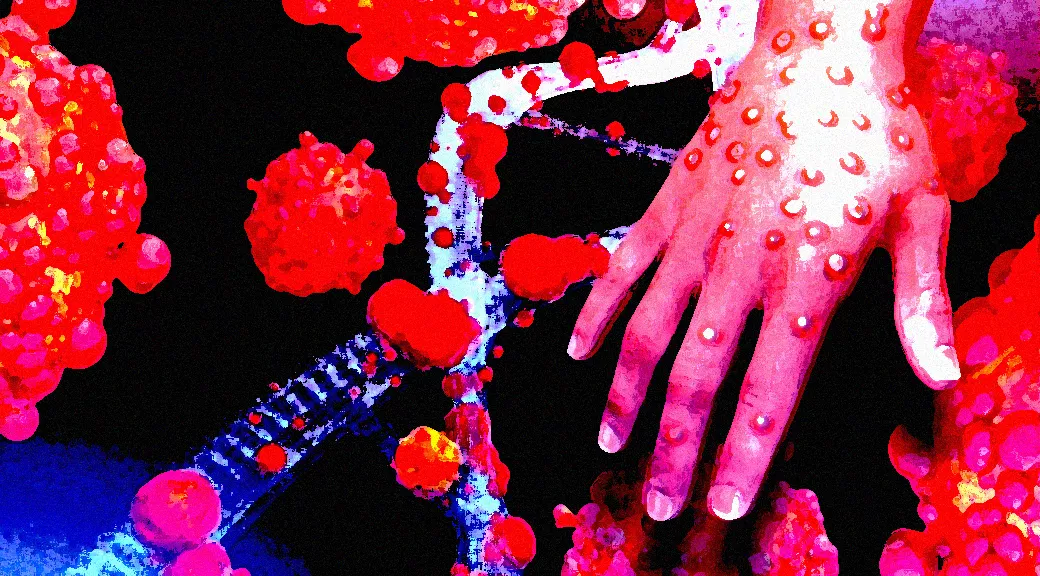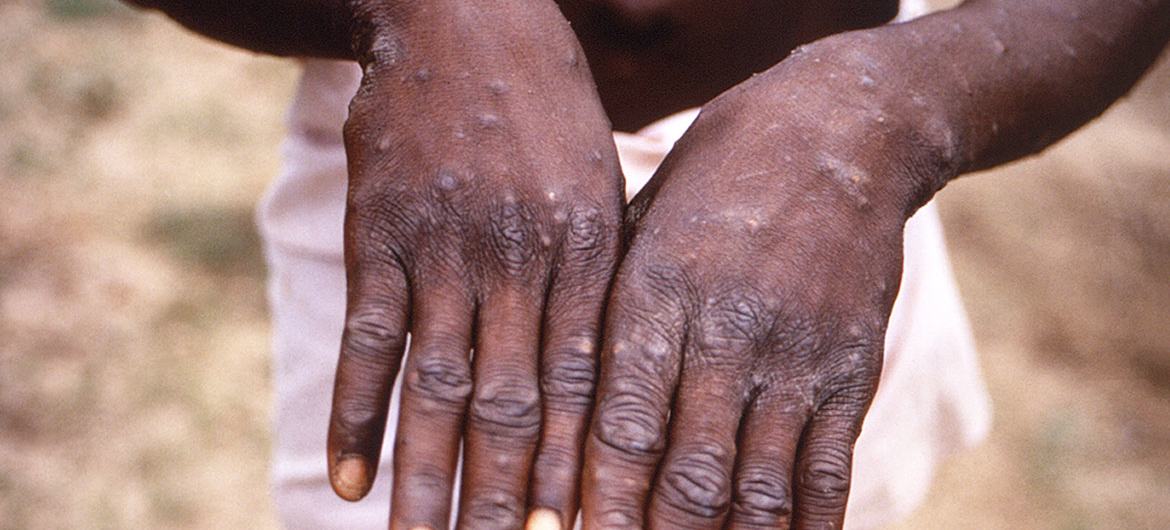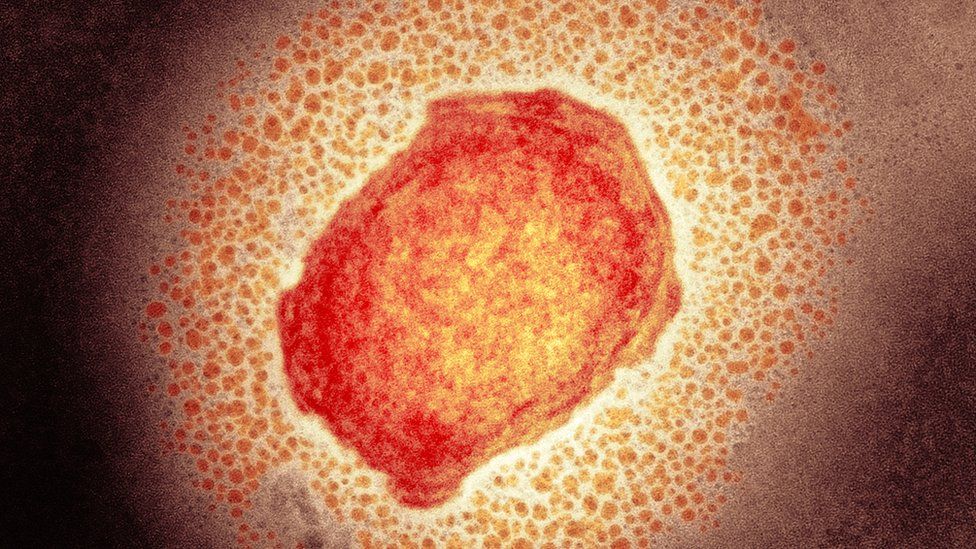Monkeypox in Thailand
5762
Monkeypox12 suspected instances of monkeypox were tested and the results came out non-detected but what was detected is Herpes Simplex Virus 1 instead

According to the Department of Disease Control (DDC), twelve suspected instances of monkeypox were tested, and the results came out non-detected. Instead, what was detected was Herpes Simplex Virus 1. There are no confirmed cases of infection in Thailand at the moment.
As Dr. Suprakit Jiraratwattana of the Medical Services Department's Dermatology Institute said, studies of herpes, chickenpox, monkeypox, and shingles show that the same virus family causes all these diseases. The patients who get infected with herpes will experience blisters on their genital areas, lips, and coccyx. The virus will stay in the patient's body even after treatment and can eventually reappear.
Compared to smallpox, monkeypox is considered less severe because smallpox has a 30% mortality rate. In contrast, the fatality rate for monkeypox is 3%-6% in countries with good public health and medical care systems and may rise to 6%-10% in less or underdeveloped countries.
Monkeypox has never been found in Thailand, even before the most current global outbreak, however, Dr Chakkarat Pittayawonganon, Head of the Bureau of Epidemiology, said that until it is confirmed that they are free of the disease, suspected cases will be subjected to tests, background checks for the risks, disease investigations, treatment, and quarantine.
In 20202, PULSE Clinic found a suspected case of monkeypox. It is undergoing clinical examinations, and we are waiting for the results. We will continue to provide excellent medical care for both sexually transmitted diseases and non-sexually transmitted diseases to make this world a better place. Learn more about Mpox Testing in Thailand
In 2023, the Bangkok Metropolitan Administration reported 136 cases of monkeypox in Bangkok, with 133 males and 3 females among the affected. Of these, 117 are Thai nationals and 19 are foreigners. Notably, 121 of the cases identified as homosexual, and some are also HIV-positive.
WHO Declares Monkeypox Public Health Emergency on August 14 2024, for the second time in two years.
In August 20204, The World Health Organization (WHO) declared the Mpox outbreak in parts of Africa a public health emergency of international concern, as the disease, formerly known as monkeypox, has killed at least 450 people during an outbreak in the Democratic Republic of Congo. The virus, particularly the more deadly Clade 1 variant, has rapidly spread across central and east Africa, raising concerns due to its high fatality rate and the emergence of a new offshoot, Clade 1b, described as "the most dangerous yet." WHO chief Tedros Adhanom Ghebreyesus emphasized the need for a coordinated international response to stop the outbreak and save lives.
The current epidemic, with over 13,700 cases in the DR Congo alone, has also spread to other African countries, including Burundi, Kenya, and Rwanda. The WHO's declaration aims to accelerate research, funding, and international public health measures. Experts have stressed the urgency of addressing this crisis, with the Africa Centres for Disease Control and Prevention declaring a public health emergency. The situation is particularly alarming given the rapid spread and high mortality rate of Clade 1, contrasting with the milder Clade 2 variant that spread globally in 2022 but was brought under control through vaccination efforts. Read:Number of New Mpox Strain Cases Spiked in Central Africa
Sweden reported on 15 August 2024 its first case of the more dangerous variant of Mpox, clade 1b subclade, marking the first instance of this strain outside Africa. The infection was confirmed in someone who had recently visited a region in Africa experiencing a significant outbreak. This variant has been particularly prevalent in the Democratic Republic of Congo since September 2023, and its detection in Sweden underscores the global spread of this more virulent strain. The World Health Organization (WHO) has declared Mpox a worldwide public health emergency. Learn more about Mpox testing in Thailand
Now, let’s learn more about Monkeypox because Monkeypox is HERE & NOW!
Monkeypox is not a trend. It's itchy and not pretty, and you will have to be isolated solely for 21 days. Here is what you need to know.
Add us on Line and stay in touch.
What is Monkeypox or Mpox?
Monkeypox is a virus transmitted with symptoms similar to those seen in the past in smallpox patients, although it is less severe. With the eradication of smallpox in 1980 and the subsequent cessation of smallpox vaccination, monkeypox has become a public health concern. Monkeypox isn’t known to be transmitted sexually. However, close contact during sexual or intimate activity, including prolonged skin-to-skin contact, is a critical factor during transmission.
How Many Types of Monkeypox or Mpox?
There are two main types of Mpox - Clade 1 and Clade 2.
The new strain of the Mpox virus is an offshoot of the Clade 1 variant, known as Clade 1b. This variant emerged around September last year due to mutations in the virus, making it more dangerous than previous strains. Clade 1b has been labelled "the most dangerous yet" and has rapidly spread, particularly in the Democratic Republic of Congo, where it has caused over 13,700 cases and at least 450 deaths since the start of the year. This strain has also been detected in other African countries, including Burundi, the Central African Republic, Kenya, and Rwanda.
Incubation Period
The incubation period (interval from infection to onset of symptoms) of monkeypox is usually 6 to 13 days but can range from 5 to 21 days.
The infection can be divided into two periods:
- The invasion period (lasts between 0 and 5 days) is characterized by fever, intense headache, lymphadenopathy (swelling of the lymph nodes), back pain, myalgia (muscle aches), and intense asthenia (lack of energy).
- The skin eruption usually begins within 1–3 days of the fever's appearance. The rash tends to be more concentrated on the face and extremities rather than on the trunk. It evolves from lesions that crust, dry up, and fall off.
How Can Someone Get Monkeypox?
Monkeypox spreads in different ways. The virus can spread from person to person through direct contact with the infectious rash, scabs, body fluids, and respiratory secretions during prolonged, face-to-face contact or during intimate physical contact, such as kissing, cuddling, or sex.
Symptoms of monkeypox can include:
- Fever
- Headache
- Muscle aches and backache
- Swollen lymph nodes
- Chills
- Exhaustion
A rash that can look like pimples or blisters that appear on the face, inside the mouth, and on other parts of the body, like the hands/palms, feet, chest, genitals, or anus. The rash goes through different stages before healing completely. This process can take several weeks.
How to Diagnose Monkeypox?
Because monkeypox is rare, your healthcare provider may first suspect other rash illnesses, such as measles or chickenpox. However, swollen lymph nodes usually distinguish monkeypox from other poxes.
To diagnose monkeypox, your healthcare provider takes a tissue sample from an open sore (lesion) and sends it to a lab for polymerase chain reaction (PCR) testing (genetic fingerprinting). You may also need to give a blood sample to check for the monkeypox virus or antibodies your immune system makes to it.
To diagnose monkeypox, your healthcare provider takes a tissue sample from an open sore (lesion) and sends it to a lab for polymerase chain reaction (PCR) testing (genetic fingerprinting). You may also need to give a blood sample to check for the monkeypox virus or antibodies your immune system makes to it.
Because monkeypox is rare, your healthcare provider may first suspect other rash illnesses, such as measles or chickenpox. However, swollen lymph nodes usually distinguish monkeypox from other poxes.
To diagnose monkeypox, your healthcare provider takes a tissue sample from an open sore (lesion) and sends it to a lab for polymerase chain reaction (PCR) testing (genetic fingerprinting). You may also need to give a blood sample to check for the monkeypox virus or antibodies your immune system makes to it.
How to Treat Monkeypox?
Monkeypox is usually a self-limited disease with symptoms lasting two to four weeks. Most people with monkeypox get better on their own without treatment. Following diagnosis, your healthcare provider will monitor your condition and try to relieve your symptoms, prevent dehydration, and give you antibiotics to treat secondary bacterial infections if they develop.
There is currently no approved antiviral treatment for monkeypox. Antiviral drugs may help, but they haven’t been studied as a treatment for monkeypox. Several investigational antivirals with activity against monkeypox are available, but only as part of a research study.
If Someone Around Me Has Monkeypox?
- Avoid contact with bedding and other materials contaminated with the virus.
- Thoroughly cook all food that contains animal meat or parts.
- Wash your hands frequently with soap and water.
- Avoid contact with people who may be infected with the virus.
- Practice safe sex, including the use of condoms and dental dams.
- Wear a mask that covers your mouth and nose when around others.
- Clean and disinfect frequently touched surfaces.
- Use personal protective equipment (PPE) when caring for people infected with the virus.
Is the Monkeypox Vaccine Available in Thailand?
Currently, there are no Mpox vaccines available in Thailand yet. JYNNEOS is a vaccine indicated for the prevention of smallpox and monkeypox disease in adults 18 years of age and older who are determined to be at high risk for smallpox or monkeypox infection.
Where Can I Get the Monkeypox Vaccine in South East Asia?
Singapore: Singapore has monkeypox vaccines available in the National Skin Center (DSC).
Thailand: Monkeypox vaccines may be limitedly available in significant hospitals or through health programs in Thailand, mainly if there are ongoing outbreaks or high-risk populations.
Indonesia: Information on monkeypox vaccine availability in Indonesia may be limited. Local health authorities can provide the most accurate details.
Malaysia: Malaysia’s health authorities would provide information on vaccine availability, especially in response to any outbreaks.
Philippines: Specific health initiatives or programs in the Philippines may offer vaccines. It is advisable to check with local health departments.
Vietnam: The availability of monkeypox vaccines in Vietnam is likely limited, with updates available from local health authorities.
Thailand: Monkeypox vaccines may be limitedly available in significant hospitals or through health programs in Thailand, mainly if there are ongoing outbreaks or high-risk populations.
Indonesia: Information on monkeypox vaccine availability in Indonesia may be limited. Local health authorities can provide the most accurate details.
Malaysia: Malaysia’s health authorities would provide information on vaccine availability, especially in response to any outbreaks.
Philippines: Specific health initiatives or programs in the Philippines may offer vaccines. It is advisable to check with local health departments.
Vietnam: The availability of monkeypox vaccines in Vietnam is likely limited, with updates available from local health authorities.
How to Prevent Monkeypox
Avoid Close Contact: Since monkeypox spreads through close physical contact, avoid direct contact with people with visible rashes or skin lesions. This includes avoiding sexual contact, kissing, hugging, or sharing personal items like clothing, bedding, or towels.
Practice Good Hygiene: Wash your hands regularly with soap and water or use hand sanitizer, especially after touching potentially contaminated surfaces or objects.
Use Personal Protective Equipment (PPE): If you are caring for someone with monkeypox, wear protective gear like gloves, a mask, and a gown to reduce the risk of transmission.
Vaccination: In some cases, vaccination against smallpox can protect monkeypox. Consult with a healthcare provider about whether vaccination is recommended for you, especially if you're at higher risk.
Avoid Contact with Infected Animals: Monkeypox can be transmitted from animals to humans. Avoid contact with wild animals, particularly in regions where monkeypox is common, and avoid consuming undercooked meat from such animals.
Isolate Infected Individuals: If someone is infected with monkeypox, they should isolate themselves to prevent spreading the virus to others until they have fully recovered.
Consider Risks in Social Settings: Although being gay, bisexual, or a man who has sex with men (GBMSM) is not in itself a risk factor for monkeypox, there have been reports in Europe and the UK of GBMSM being exposed to and infected with monkeypox through sexual and other close, intimate contact. Settings such as bathhouses, rave parties, and other events involving sexual activity have been implicated in recent outbreaks. Therefore, it's essential to be aware of the risks associated with these environments.
Can Acyclovir Treat Monkeypox
Acyclovir and valacyclovir are antiviral drugs commonly used to treat infections like herpes in humans. Cidofovir and Brincidofovir work similarly by blocking an enzyme called DNA polymerase, which viruses need to copy their DNA and multiply. While lab and animal studies suggest these drugs might be effective, it's still unclear whether they would help treat monkeypox in humans.
Trust PULSE CLINIC to take care of your health like other 45000 people from over 130 countries. We provide discreet professional service with high privacy. Here to help, not to judge.




